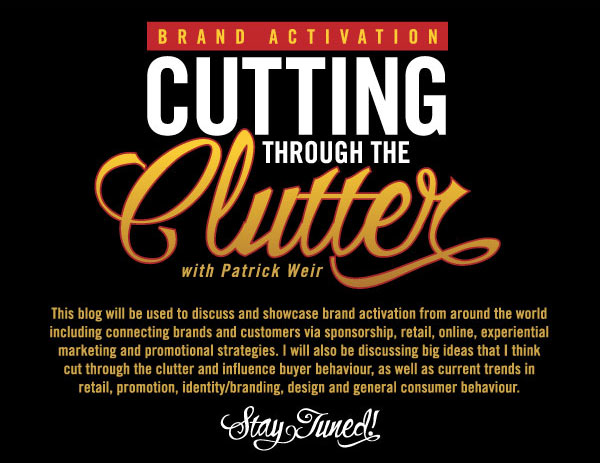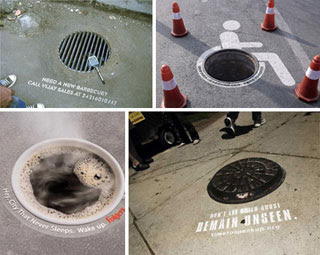Thanks to everyone for their emails, I'll do my best to answer them soon. Sorry it has been a lil while since my last entry but I am going to do my best to update this more often. My schedule has been insane so I haven’t had a lot of free time to think…this entry will take you through 10 great non-traditional campaigns followed by 5 not so great ones. It is interesting that there is a little overlap.
Cheers. Patrick
10 Great Examples of Non-Traditional Advertising
Non-traditional marketing has emerged as one of the most effective methods marketers use to break through the current ‘ad overload’ that society has trained itself to tune out. These 10 awesome non-traditional marketing campaigns build on the history of non-traditional marketing to illustrate where, why, and how the media markets their message in unexpected ways.
Effective ads don’t always demand a big budget. The above installation for 3M Security Glass uses just $500 in real currency but looks to be much, much more. The impression was strengthened by posting a security guard at the site, just to prevent anyone with dollar signs in their eyes from attacking the display with a tire iron. Use of the hands and feet WAS allowed, however, and the artful ad reportedly could take a kicking and keep on tricking.
Causing a Mob Scene in NYCShock value is a big part of any successful non-traditional marketing campaign. Not unlike my previous Showtime-Dexter reference, specialty TV network HBO had a “hit” with the above campaign that played on the crime theme of The Sopranos. One has to wonder, though, if the cab drivers whose taxis hosted the ads suffered a drop in their business!
One thing that sets non-traditional marketing apart from other more traditional forms of advertising is its ability to catch the public notice in an unexpected way. The quartet of manhole ads above play on people’s tendency to keep their eyes on the ground to watch where they’re going - and just maybe, what they’re going to buy.
2007 Boston Moonitie ScareSometimes a non-traditional marketing campaign has to go wrong before it goes right. A classic example is the so-called 2007 Boston Moonitie Scare, originated and organized by Interference Inc. as a unique way to advertise the Adult Swim Network’s cartoon show, Aqua Teen Hunger Force. The plan was to set up several dozen Nite Brite style, battery-powered placards in high visibility urban locations that included bridge overpasses and transportation hubs. The non-pro’s installing the devices attracted a different kind of attention from Boston city authorities hypersensitive to unusual activity post 9-11, who overreacted on a massive scale. It’s easy to look back and ask Interference Inc., “What were you thinking?” but in actual fact the unexpected blast of media exposure did more for their clients then they likely expected.
It’s said that sex sells, and really, who’s going to argue the point? Even so, it’s possible to use sex - or rather, human interest in the topic, to non-traditional market products. D&G did just that for a memorable campaign that employed a giant billboard of a model wearing a D&G bra. That’s not all, of course. Peering closer, curious onlookers noticed that the main image was actually a mosaic of hundreds of individual women wearing different styles of D&G bras. The deal was sealed when D&G’s ad agency created a website where those interested could zoom in to view the mosaic up close and very, very personal.
Cingular Wireless’ jumbo non-traditional marketing ad also used shock as a weapon, though without any gory connotations. The ad shown above works on a number of levels, attracting those looking down, those looking up or from a distance, and appealing to the funny bone by having the word “dropped” appear to have dropped right off the billboard.
Firefox on FireNon-traditional marketing has many similarities to other new, non-traditional marketing methods such as viral marketing. Hanging a label on a campaign is merely a matter of semantics in many cases and there are gray areas, exemplified by the historic New York Times as for Firefox 1.0 that appeared on December 16, 2004. The 2-page ad was funded through contributions from 10,000 people who paid to have their names featured on one of the pages. The donation drive conducted by the Mozilla Foundation set out to raise $50,000 to cover the cost of the ad but ended up raising 5 times that amount. As for Firefox, well, everyone knows how that story turned out.
Some non-traditional marketing campaigns take advantage of pre-existing features of a location in order to magnify their impact. Such is the case with the above two ads from Brazil’s Hopi Hari amusement park and Hewlett Packard printers that take advantage of moving escalators to underline the theme.
Sometimes two very different companies will partner up to boost a non-traditional marketing ad’s reach. The above ads illustrate that point. In the topmost ad, German lingerie company Triumph International attracts extra attention - not as if they need it - to their message by adding a third dimension provided by Hubba Bubba bubblegum.
Be Odour ReadyUsing ordinary fixtures in extraordinary ways is another key to effective non-traditional marketing, as can be seen in this very creative for Right Guard deodorant. Once again, non-traditional marketers take advantage of society’s ingrained responses to red emergency boxes and triangular warning signs.
It’s hard to say whether non-traditional marketing is clever, we as a society are jaded enough to fall for its charms, or both. Any way you look at it, these ads show that in the cutthroat game of sales success, you’ve got to think more non-traditional to cut through the clutter!
and now...
5 Great Examples of Non-Traditional Advertising Gone Wrong
Non-traditional marketing is often a risky business, skirting the edge of ethical (or even legal) acceptability. Some non-traditional marketers who have crossed the line have caused everything from Olympic belly flops to citywide bomb scares and have been punished with anything from modest jail time to millions of dollars in fines. All the same, some of these are probably (secretly) considered successes because subsequent media attention to the debacles probably raised more awareness than the non-traditional campaigns alone ever could have. Some non-traditional marketing is even done to support good causes though much of it is created to line the pockets of giant corporations. Know of other great examples of non-traditional marketing gone wrong? Be sure to list them below!
Keep Austin Weird!
The Microsoft Zune arguably has more haters than fans, apparently including some police officers in Austin, Texas. A person postering guerrilla advertisements for the Zune was detained and handcuffed by authorities at SXSW last year. According to one eyewitness the police were overheard saying something like “We’ll have none of your advertising for your DRM crippleware crappy MP3 player littering our town.” Now that is an interesting reason to state for arrest if ever there was one.
Olympic Sized Belly Flop
The Olympics aren’t games to be toyed with apparently, as one tutu-wearing prankster learned the hard way. In an effort to non-traditional market an online gaming site a Canadian man leapt into an Olympic pool at the 2004 Athens games. He was convicted of various counts of trespassing and creating a disturbance and was sentenced to multiple months in a Greek prison but then released with a fine of just a few hundred dollars. Some divers were apparently put off by the intervention and subsequently failed to complete their dives.
I Am Great, Just Ask Me
We’ve all heard of subtle non-traditional marketing campaigns aimed at mentioning products casually so that passers-by will overhear a name-drop and it should be no surprise that this kind of marketing has found its way online as well. Nvidia is one of a number of companies that has been accused of seeding online forums with fake-fan support for their products. Of course, when the truth comes out real forum users are often none-too-pleased with the deception and the lame excuses provided by the marketers or companies accused.
You Suck Judd Apatow
There are many fans of the new movie Forgetting Sarah Marshall - unfortunately, most women named Sarah Marshall aren’t among them. Non-traditional-style scrawled ads posted around the country have featured disparaging phrases like “You Suck Sarah Marshall” leading up to the film’s release. Perhaps it never occurred to the non-traditional marketers behind these campaigns that there are, in fact, many real-life women with that name. Responses have ranged from frustration to raging retaliation (with comparable “You Suck” signs aimed at the film’s director). The lucky woman, however, who owns SarahMarshall.com was relatively pleased with the tens of thousands of visitors her website received.
Lite-Brite Bomb-Scare
Of course, no discussion of non-traditional marketing gone wrong could possibly be complete without the 2007 Boston bomb scare. A number of LED signs designed to promote the television program Aqua Teen Hunger Force were mistakenly identified as explosive devices. At the time, these cute little blinking cartoon figures probably seemed like a brilliant way to raise curiosity. In retrospect, in this post-911 world installing a series of complex wire-filled devices with their own power sources on public structural elements like bridge supports was probably a tremendously terrible idea. Worse yet, the marketing company and device designers failed to notify the police of the devices’ true purpose even after learnings that they were being treated as bombs by authorities. Though no jail sentences resulted from the incident Turner Broadcasting paid millions of dollars to city police and Homeland Security to resolve the matter.

















I recently came across your blog and have been reading along. I thought I would leave my first comment. I don't know what to say except that I have enjoyed reading. Nice blog. I will keep visiting this blog very often.
ReplyDeleteBetty
http://laptopprocessor.info
Hi unlike the guy above I do know what to say!
ReplyDeleteGood post but one or two errors in the Cingular ad the word dropped is calls not dropped as per pic. Also you've included the Boston example in both lists isn't that cheating?
Tyrone